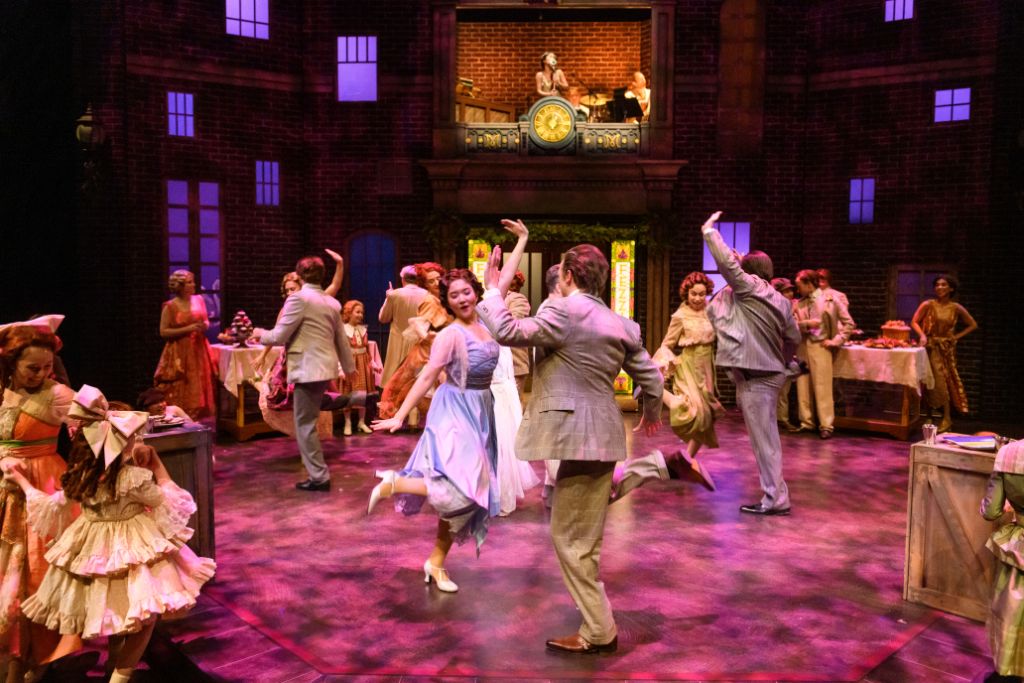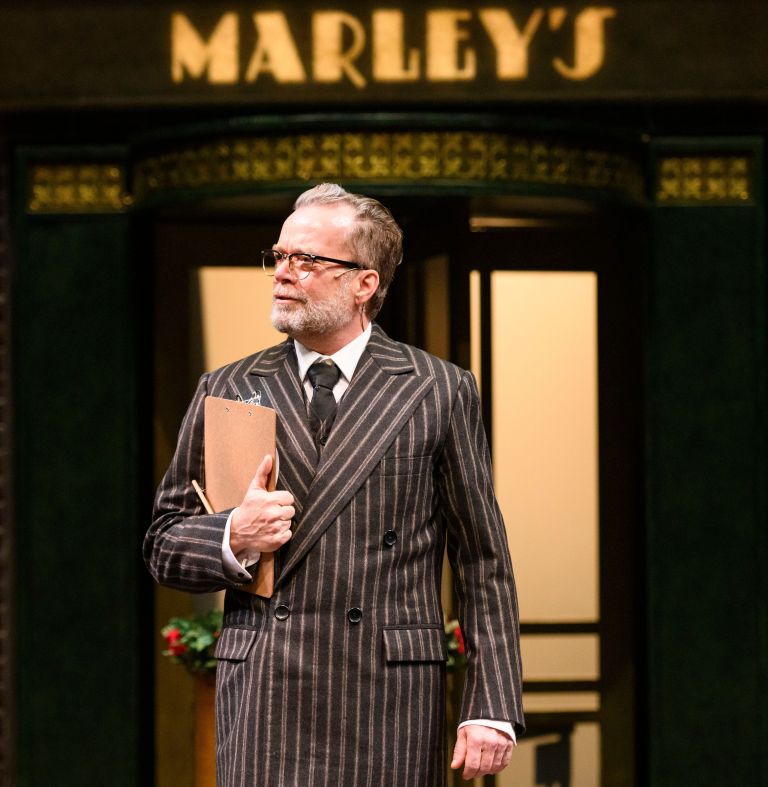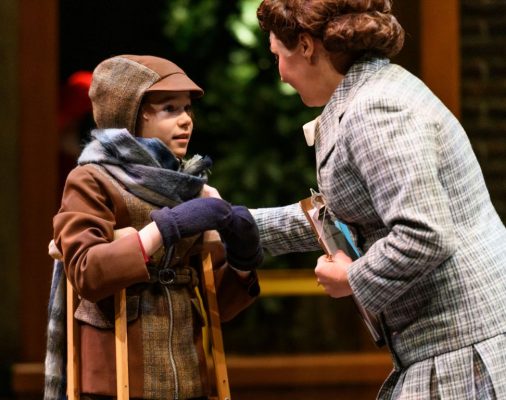Did Citadel Theatre Ruin A Christmas Carol in Bold New Production? Colin Says No
Posted on December 6, 2019 By Colin MacLean Entertainment, Front Slider, news, Theatre

Last year, after a successful run of 19 seasons, the Citadel Theatre sent off its justly esteemed production of A Christmas Carol (originally written by Edmonton’s own Tom Wood, who was the first Scrooge) – to the special corner of Elysium that preserves the Ghost of Christmas Past.
But this isn’t the end of Dickens at the Citadel. Far from it. The cherished Cratchit family, that irascible old curmudgeon Scrooge, the ghosts and all the other Dickensian creations have returned to haunt the halls and stages of the theatre in a brand new production – one that sparkles with Christmas spirit, and some significant changes. It plays in the Maclab Theatre through Dec. 23. There’s a Dickens Fest in the lobby, too.
Citadel Artistic Director Daryl Cloran enlisted the help of local writer David van Belle to develop a whole new concept.
In 1843, when Dickens published his novella, London was a centre for poverty, crime and pollution. Outraged, Dickens wrote of a different world – one which valued love and caring “for the benefit of our fellow men.”
 In searching for an epoch that might contain echoes of Dickens’ time, Cloran and van Belle came up with the ‘40s and ‘50s of the 20th Century. We had just come off the Great Depression and a terrible World War, and we were enjoying a period of peace, prosperity and productivity. And, as in Dickens’ time, Christmas was changing – developing a whole new set of traditions. Movies like Miracle on 34th Street and It’s a Wonderful Life were released. Songs like Rudolph the Red Nosed Reindeer, Silver Bells, White Christmas and so many others were on the Christmas hit parade.
In searching for an epoch that might contain echoes of Dickens’ time, Cloran and van Belle came up with the ‘40s and ‘50s of the 20th Century. We had just come off the Great Depression and a terrible World War, and we were enjoying a period of peace, prosperity and productivity. And, as in Dickens’ time, Christmas was changing – developing a whole new set of traditions. Movies like Miracle on 34th Street and It’s a Wonderful Life were released. Songs like Rudolph the Red Nosed Reindeer, Silver Bells, White Christmas and so many others were on the Christmas hit parade.
And so the basis for a new interpretation of A Christmas Carol was found. Does it work? I’m sure many will miss the classic resonances of the original but if this glowing production is to be the new Citadel celebration of the season, they’ve come up with a winner. The 1850s and the 1950s do indeed fit together well and prove that Dickens’s characters are timeless.
This a lavish and eye-filling production with a cast of 36, including 11 youngsters from the Citadel’s theatre school, and a live band.
The story is now set in an unnamed American city (but obviously New York). And alas, there is no Bob Cratchit. The poor chap was killed in the war, leaving the impoverished widow Mrs. Cratchit (Alison MacDonald) to support her children. She works for that crotchety miser Ebenezer Scrooge (Ted Dykstra), who owns the large department store, Marley’s. Like his Victorian predecessor, he’s a bottom-line kind of guy, putting business before everything else. But as the story goes, on Christmas eve he is visited by the shade of his old partner Jacob Marley (Julien Arnold) – who returns from the grave in an effort to reclaim the old goat before his soul is fettered for all of time by the chains he has “forged in this life.”
This is a highly accessible family production. Because they speak in colloquial dialogue the characters seem even more real. The Cratchit family huddling together in unspeakable pain after the death of the little boy was one of the most heartbreaking scenes I’ve seen in 30 years of reviewing.
 Cloran has put his mark on the production, showing his usual flair for inventive staging. The Citadel boasts a fabled production facility and the director is obviously having a wonderful time pushing his theatre’s buttons. Magic, unexplained events and awesome production values fall like winter snows throughout the show.
Cloran has put his mark on the production, showing his usual flair for inventive staging. The Citadel boasts a fabled production facility and the director is obviously having a wonderful time pushing his theatre’s buttons. Magic, unexplained events and awesome production values fall like winter snows throughout the show.
Playwright van Belle has managed to include the best of Dickens while dropping some scenes (and characters) and ingeniously moving others around. The playwright also exhibits a sly sense of humour that is all his own. When the Scrooge of yore accused the ghost of Marley as just being, “a scrap of undigested meat,” the modern Scrooge comments, “You are probably just a bit of bacteria. If I’d have finished that meal – you’d have been Santa Claus by now.”
The duo’s version is now a musical. The songs include Have Yourself a Merry Little Christmas, Carol of the Bells and It’s the Most Wonderful Time of the Year. The cast sings as well as they act.
The all-local players perform with jubilant aplomb. Stand outs are Vance Avery and Belinda Cornish as the spirited Fezziwigs; Arnold is an angry and anguished Marley, and when we get a glimpse of his scary after-life you begin to realize why he’s trying to save Scrooge from a similarly awful fate. Sasha Rybalko’s Tiny Tim is a heartbreaker, and Lilla Solymos a feisty Ghost of Christmas Past. Cynthia Jimenez-Hicks makes a vivacious Bell, and Chariz Faulmino gives full voice and a bouncy dynamic to the Fezziwig party. MacDonald is a loving mother and gets a solo which she roasts like a chestnut over an open fire. Ruth Alexander, who blows a mean sax in the band, plays the put-upon Mrs. Dilber, who has a final scene with Scrooge that is just plain classic. It got a spontaneous burst of applause from the opening night audience.
Of note is John Ullyatt, who takes a spectacular turn as the Ghost of Christmas Present. He begins as a fast-talking snappy-patter huckster from the 1920s, ages considerably to become a middle-aged party goer, and finally ends up as – well, you just wait. It is a tour-de-force. The Ghost of Christmas Yet To Come is indeed a chilling apparition who undergoes a frightening metamorphosis just before it disappears into the otherworld.
Of course, any A Christmas Carol hangs on the hunched shoulders of Ebenezer Scrooge. St. Albert’s Ted Dykstra has returned from Toronto for the role. He may not obliterate Tom Wood’s magisterial reading, but Dykstra is one of our best actors and puts his own indelible stamp on the role. With slicked-back hair and imperious manner, he at first underplays Scrooge but leaves no doubt of the malevolence just under the reserve. As the evening progresses, he warms quite believably and even adds a note of poignancy in the scenes where he is both bewildered and touched by the loving and true-hearted nature of Tiny Tim. After a particularly spooky moment when he faces his own death, his glee at escaping what he felt was his inevitable doom is funny and exuberant. Dickens observed in his book “…his heart laughed.” This fine actor will make your heart laugh too.
Cloran and van Belle tend to gloss over the manifest social comment of Dickens’ original – but this is not hardscrabble Dickensian London. It’s New York at a time of prosperity and contentment. The production does have a number of effectively sombre moments (what would this story be without them?), but Cloran and van Belle have come up with an entertaining version of the original and a good-natured and cheerful reminder of the joys of Christmas.
As it has been for the past 19 years, the cast will collect Food Bank donations on the way out. Who is going to refuse a few ha’pennies to Tiny Tim himself?
Photos by Ian Jackson













